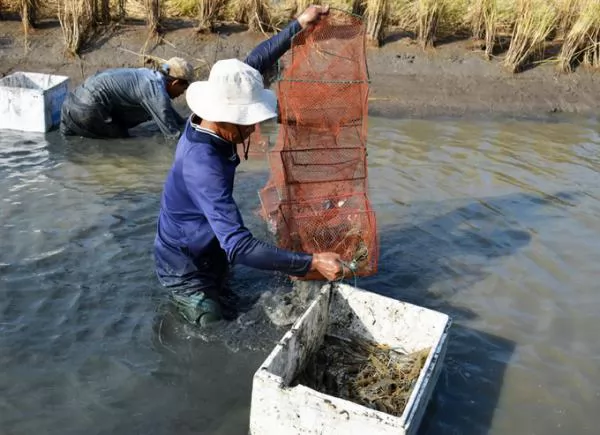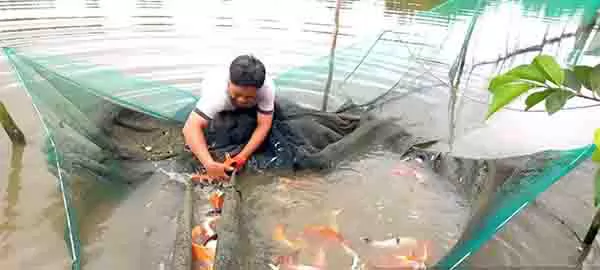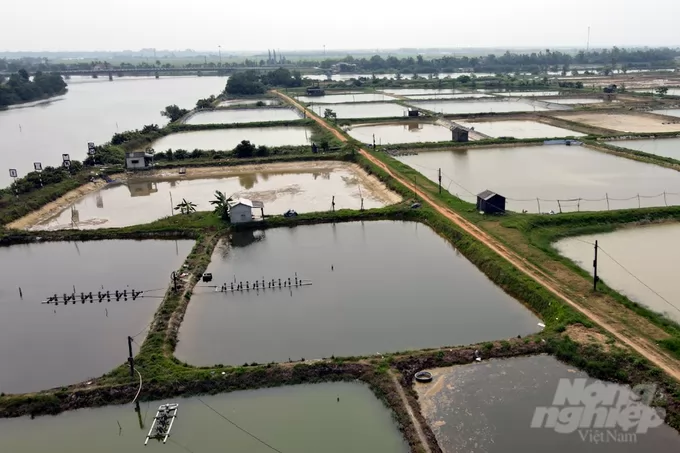Trà Vinh households plant forests to prevent coastal erosion, earn money

Planting mangrove forests in Trà Vinh Province's Cầu Ngang District. - VNA/VNS Photo Thanh Hòa
TRÀ VINH – Households in the Cửu Long (Mekong) Delta province of Trà Vinh have been planting protective forests in coastal areas to prevent erosion and earn a living for a number of years.
Nguyễn Vũ Phương, head of the province’s Forest Protection Sub-department, said the coastal districts of Cầu Ngang, Châu Thành and Duyên Hải and Duyên Hải Town had planted 625ha of new protective forests since 2015.
The province now has more than 9,200ha of protective forests, mostly mangrove forests in coastal areas. The forests help prevent strong winds and waves, protect coastal areas from erosion, and provide livelihoods for local households.
Of the 9,200ha, about 4,000ha mangrove forests are planted by households who breed black tiger shrimp under extensive farming methods and other aquatic species in forests. The shrimp – forest farming model is sustainable and protects the environment.
According to Trần Thanh Nhàn, deputy director of the Trà Vinh Protective Forest Management Board, households planting mangrove forests spend less investment capital and reduce the risks associated with shrimp cultivation caused by weather, environment and disease.
The shrimp – forest farming model suits households that do not have enough money to invest in intensive and super intensive shrimp breeding methods.
The model produces biological shrimp, which are preferred by consumers at home and abroad.
The price of shrimp bred under the model is 15 – 20 per cent higher than shrimp farmed under intensive and super-intensive shrimp breeding methods.
Huỳnh Văn Phong has a 4ha area in Duyên Hải Town’s Hiệp Thạnh Commune where he breeds about 50,000 black tiger shrimp and 6,000 mud crabs in the forest area a year. He only buys shrimp and mud crab fry, and does not need to buy food because they eat the natural food in the mangrove forest.
He earns an average income of VNĐ200million (US$8,600) a year from breeding shrimp and mud crabs.
Phong also breeds other aquatic species like mud clams and blood cockles in the mangrove forest, earning dozens of millions of đồng a year.
Phương, head of the province’s Forest Protection Sub-department, said the province allocated 5,127ha of protective forests to 4,241 households and five organisations.
“The allocation of forests for households has enhanced awareness about forest protection in the community and reduced violations of forest protection regulations,” he said.
Besides offering financial support for protecting forests, the province has provided funds to forest-protection households to breed aquatic species in mangrove forests.
The breeding of aquatic species offers an income of VNĐ40 - 50 million ($1,700 – 2,150) per hectare a year, according to forest – protection households.
Trà Vinh has a coastline of 65 kilometres. – VNS
Maybe you are interested

Delta farmers reap high profits from breeding giant river prawn
Viet Nam News | HCM CITY — Farmers in the Mekong Delta have had a bumper harvest of giant river prawns at good prices because of favourable weather conditions and high market demand.

Farmer raises Japanese koi in saline water
HCM CITY — Many farmers in Bình Chánh District of HCM City have switched to raising ornamental Japanese koi fish in saline water in recent years.

High-tech and climate resilience shrimp farming
High-tech shrimp farming continues to grow, whereas traditional shrimp farmers suffer losses due to climate change and environmental pollution.





